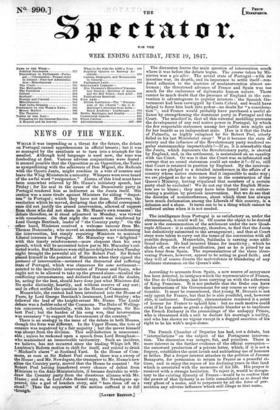The discussion leaves the main question of intervention much where
it was before the debate began. The course taken by Mi- nisters was a pis aller. The actual state of Portugal—with its intestine war, its dearth, and its impotence to settle itself—ren- dered adhesion to the doctrine of nonintervention almost un- human; the threatened advance of France and Spain was too much for the endurance of diplomatic human nature. There cannot be much doubt that the presence of England in the con- vention is advantageous to popular interests : the Spanish Go- vernment had been earwiggecl by Costa Cabral, and would have helped to force him back into power—no doubt for "a considera- tion"; and France would probably have purchased a useful al- liance by strengthening the dominant party in Portugal and the Court. The mischief is, that all this external meddling prevents the development of any real native power in Portugal, by which the few respectable statesmen among her public men might act for her benefit as an independent state. How is it that the Duke of Palmella, so highly eulogized by Sir Robert Peel, utterly failed in his last Ministerial essay? Was it because the state of society and the influence of the Revolutionary party rendered re- gular statesmanship impracticable ?—If so, it is remarkable that the Junta, which represents the Revolutionary party, is abetted by England, and, in the settlement, is maintained on an equality with the Court. Or was it that the Court was so infatuated and corrupt that no sound statesman could act under it T—If so, still that Court is retained in position by England. By the interven- tion we are pledged to a detailed interference in. the affairs of a country whose native statesmen find it impossible to make way; we are pledged so far as to interpose in the construction of the Queen's Ministry, having stipulated that members of a certain party shall be excluded! We do not say that the English Minis- ters are to blame ; they may have been forced into so embar- rassing a position by previous intervention. But we do see that the doctrine of noninterference, about which there has always been much declamation among the Liberals of this country, is a delusion and a sham. It turns out to be a thing which cannot be enforced unless when it is not needed.


























